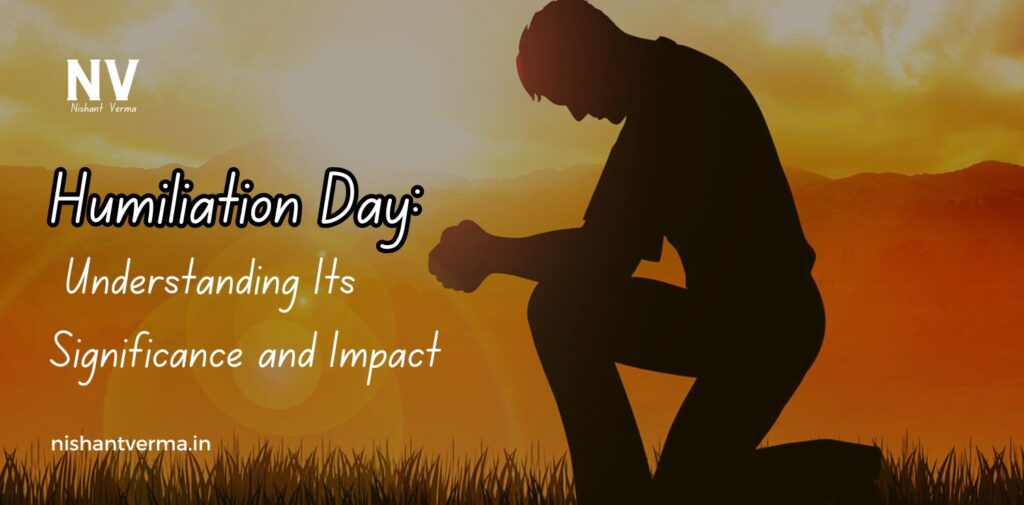Humiliation is a powerful emotion that can affect an individual’s self-esteem and mental health. It is a feeling of shame or embarrassment that arises when someone feels disrespected, belittled, or degraded. Many people experience humiliation at different stages of their lives, whether in personal relationships, at work, or in public. In some countries, including India, there is a day dedicated to acknowledging this emotion and its effects—Humiliation Day, celebrated on January 3rd.
But what exactly is “Humiliation Day”? Why is it important to observe this day, and how can it help us understand the emotional struggles that many people go through? In this article, we will explore these questions and examine why awareness about humiliation is crucial in today’s society.
What is Humiliation?
Humiliation is an intense feeling of being publicly embarrassed, degraded, or made to feel inferior. It goes beyond just feeling ashamed; it affects one’s dignity, often in front of others. For example, if someone is mocked or criticized harshly in front of their peers, they might experience humiliation. This can happen in various situations, such as at school, work, or even in social media interactions.
Humiliation is often a result of judgment, ridicule, or belittling comments that make a person feel worthless. Unlike other negative emotions, such as anger or sadness, humiliation attacks the very core of a person’s identity, making them question their worth or value.

The Origins of Humiliation Day
Humiliation Day is not widely known, but it is gaining recognition around the world, including in India. The day was established to raise awareness about the emotional pain caused by humiliation and to encourage empathy and understanding for those who experience it.
The date, January 3rd, was chosen because it holds symbolic significance in various cultures. In some cultures, it marks the end of the winter season and the beginning of a fresh start. Humiliation Day serves as an opportunity to reflect on past experiences of humiliation, heal from them, and create a more compassionate society moving forward.
In India, where traditional values of respect and honour are deeply ingrained, humiliation can have profound effects on both individuals and communities. By dedicating a day to discussing humiliation, we aim to build a more supportive environment for those affected by it.
Why Humiliation is Harmful
Humiliation can have long-lasting effects on a person’s mental health. When someone is humiliated, it often leads to feelings of worthlessness, depression, anxiety, and social withdrawal. These feelings can cause individuals to lose confidence in themselves and their abilities. In severe cases, humiliation can even lead to self-destructive behaviour, including suicide.
It is also important to note that humiliation can have a ripple effect. It does not only affect the person who experiences it but also the people around them. In family settings, for example, children who witness their parents or relatives being humiliated may internalize this behaviour and begin to develop unhealthy coping mechanisms.
The negative consequences of humiliation extend beyond personal trauma. In a broader societal context, humiliation can contribute to divisions between different social groups, fostering an environment of intolerance and hostility. This can create barriers to understanding and cooperation, preventing people from coming together in unity.

Humiliation in Indian Society
In India, humiliation takes on unique forms due to the cultural, social, and political landscape. In a country where traditional family structures and social hierarchies often dominate, feelings of humiliation can arise from a variety of sources, such as caste, gender, religion, and economic status.
For example, in rural areas, women often experience humiliation due to gender-based discrimination. They may be subjected to harsh treatment or scolding for not conforming to traditional roles or expectations. Similarly, individuals from lower castes may face public humiliation because of their social standing. In urban settings, too, people face humiliation based on their appearance, lifestyle choices, or lack of material wealth.
The rise of social media in India has also contributed to the spread of humiliation. People are frequently ridiculed online for their opinions, appearance, or personal lives. This type of virtual humiliation can be just as damaging, if not more so, than face-to-face humiliation.
How Can Humiliation Day Help?
Humiliation Day provides an opportunity to reflect on the pain caused by humiliation and how we, as individuals and as a society, can reduce it. Here are some ways in which Humiliation Day can make a difference:
- Promote Empathy: Humiliation Day can help us understand the emotional impact of humiliation on others. By empathizing with people who have been humiliated, we can work towards creating a more compassionate and supportive environment. Empathy allows us to connect with others on a deeper level, reducing judgment and fostering understanding.
- Encourage Respectful Behavior: One of the primary causes of humiliation is disrespectful behaviour, whether intentional or not. Humiliation Day serves as a reminder for individuals to treat others with kindness, respect, and dignity. This can be particularly important in workplaces, schools, and social settings, where people may inadvertently belittle others.
- Raise Awareness about Mental Health: Humiliation is often linked to mental health issues, including depression, anxiety, and low self-esteem. By acknowledging the impact of humiliation, we can start conversations about mental health and reduce the stigma associated with seeking help. This can encourage people to speak out about their experiences and seek support when needed.
- Foster Positive Change: By observing Humiliation Day, society can begin to address the root causes of humiliation, such as inequality, prejudice, and bullying. By taking collective action, we can work towards building a more inclusive and just society where people feel valued and respected.

Conclusion
Humiliation is a painful emotion that can affect anyone, regardless of their background or status. Humiliation Day, observed on January 3rd, serves as an important reminder to reflect on the harm caused by humiliation and its impact on individuals and society. It is a day to promote empathy, kindness, and respect, while also raising awareness about mental health and the consequences of humiliation.
In India, where respect and honour hold great cultural significance, addressing the issue of humiliation is crucial for fostering a harmonious and inclusive society. By acknowledging the emotional pain of humiliation and working towards a more compassionate world, we can help reduce the damage caused by this harmful emotion and create a brighter future for all.
Let Humiliation Day be a call for change—an opportunity to reflect, heal, and move forward together with greater understanding and respect.




